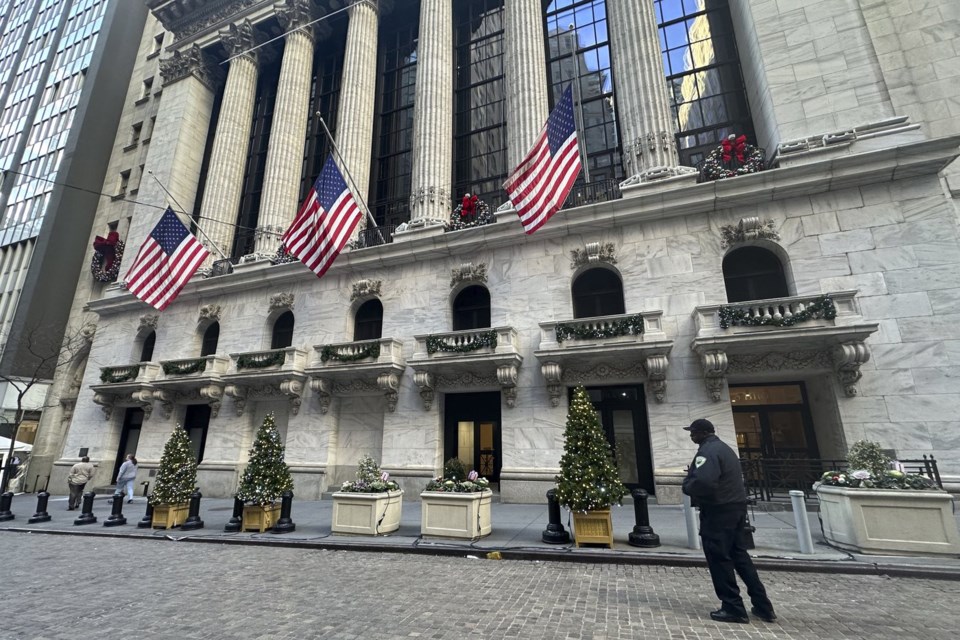NEW YORK (AP) — Wall Street’s big rally is running out of momentum and U.S. stocks are drifting as they near the end of another roller-coaster week. The S&P 500 was down 0.1% in early trading Friday following three days of big gains. The Dow Jones Industrial Average was down 90 points, and the Nasdaq composite fell 0.1%. Intel weighed on the market after the chip company gave a forecast that fell short of analysts’ expectations. Two out of every three stocks in the S&P 500 were falling, but Google’s parent company helped limit the losses after reporting a better profit than expected. Treasury yields eased.
THIS IS A BREAKING NEWS UPDATE. AP’s earlier story follows below.
Wall Street is on track to open with modest losses Friday, though the retreat before the bell is not enough to negate a broad rebound in market s this week.
Futures for the S&P 500 fell 0.1%, while futures for the Dow Jones Industrial Average lost 0.4%. Nasdaq futures also ticked down 0.1%.
The slight downturn follows three straight days of gains, propelled by strong corporate earnings and hopes for the Federal Reserve to cut interest rates.
Shares of Alphabet jumped 5% overnight after Google's parent company reported late Thursday that its profit soared 50% in the first quarter. Google's stellar results come as the tech giant faces competitive and legal threats amid an economy roiled by a global trade war. Before Friday's after-hours gain, Alphabet shares had fallen by 16% since the end of last year.
On the losing side in premarket trading was Intel, which beat Wall Street's quarterly projections, but issued conservative guidance for 2025. Executives cited an “increasingly uncertain” economic landscape driven by shifting trade policies, persistent inflation and increased regulatory risks. Intel shares slid 6.8% before markets opened.
President Donald Trump's tariff announcements, often followed by reversals or pauses of those policies, have been roiling markets since Trump took office in January. Though companies have largely continued to post strong earnings, many have cut or pulled their guidance for the year, citing economic uncertainty around Trump's trade policy.
Elsewhere, in Europe at midday, the CAC 40 in Paris added 0.7%, while Germany's DAX was 0.4% higher. The British FTSE 100 was unchanged after the country reported better-than-expectation retail sales in March.
Tokyo's Nikkei 225 surged 1.9% to 35,705.74 and the Kospi in South Korea gained 0.9% to 2,546.15.
Hong Kong's Hang Seng picked up 0.3% to 21,980.74, while the Shanghai Composite Index inched down 0.1% to 3,295.06.
The rally was boosted by hopes that Trump was softening his approach on tariffs and his criticism of the Federal Reserve, but China denied Thursday it’s involved in active trade negotiations with the U.S.
Tech stocks rose in China after some semiconductor import companies told Caijing Magazine that some chips made in the U.S. had been quietly exempted from the country's 125% retaliatory tariffs.
The Lenovo Group rose 3.4% while the Chinese search engine company Baidu added 3.9%.
However, the shares of China's largest semiconductor foundry, Semiconductor Manufacturing International Corporation, lost 2.8%.
Taiwan's Taiex added 2%. India's Sensex sank 0.4% after tensions with Pakistan over the Pahalgam terror attack.
The market in Australia was closed because of Anzac Day.
In other moves early Friday, U.S. benchmark crude oil shed 80 cents to $61.99 per barrel in electronic trading on the New York Mercantile Exchange.
Brent crude, the international standard, slid 81 cents to $64.84 per barrel.
The U.S dollar rose to 143.29 Japanese yen from 142.69 yen. The euro edged lower, to $1.1363 from $1.1391.
——-
Jiang Junzhe And Matt Ott, The Associated Press



